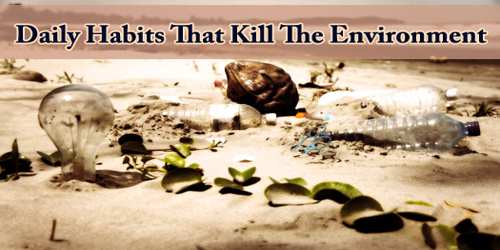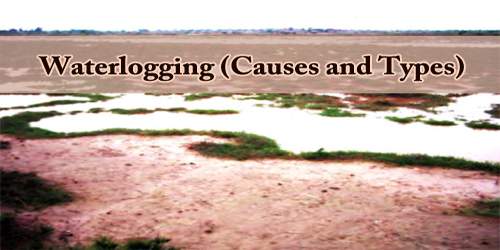As humans, each of us are individually responsible for protecting Mother Nature. We know that improper waste disposal at large corporate companies damages the environment severely. But what we do not know is that there certain personal habits and things that we do daily that cause a negative impact on the environment as well. These are some habits that we can easily eliminate if we give it a shot. Even if one person is willing to change, it can make a huge difference to our environment. The following are some such habits that you need to get rid of immediately.
Leaving the Lights On – Since most of the people who are alive today were born into a world with electricity, they do not know how to live without it. This has made them take such precious natural resources for granted. Turning the lights off, even if we are only leaving the room for a “few minutes”, can make a huge difference. It does not matter whether you are going to the next room; switch it off all the same. This will enable us to prevent this energy source from being wasted unnecessarily.
Boiling The Kettle – Many people guess the amount of water they need when they boil the kettle, and they end up boiling too much. Boiling a kettle actually uses a lot of power enough to light a whole household which also costs the householder money. There are energy efficient kettles available that can help to reduce energy usage, and kettles that measure how much water is needed for a single mug or a pot of tea. An easy way to ensure that we aren’t boiling away this valuable resource is to measure the amount of water we need first, for example with the mug we are going to drink out of or the pot you are planning to cook with.
Improper disposal of batteries and ink – Household batteries contain traces of mercury and other toxic chemicals that damage wildlife and sea life when they accumulate and leak into ecosystems around the world due to improper disposal. Ink cartridges, on the other hand, have a more toxic effect on the environment when not disposed of correctly.
Each year millions of cartridges end up in landfills every single year which poisons the soil and further degrades the environment. These chemicals have the added ability to accumulate within the animals (termed as biomagnification) meaning that they are passed along the animal life cycle and food chains harming even more and more animals.
Excessive uses of plastic – Items on sale in shops are mostly packaged in plastic containers. On top of this, most carrying bags offered at the cashier’s register are also plastic in nature. Statistically, the food packaging accounts for nearly 70% of all household trash and waste that eventually end up in landfills. The problem is that plastics are a major pollutant to the environment due to their inability to degrade naturally having a life cycle that can extend to millennia. This means that as more and more plastics end up being dumped in landfills, decomposition does not take place thus adding any value on earth.
Throwing food as waste – Many people think that it is a formal courtesy not to completely empty a plate during a meal. But, throwing food is bad in the sense that it is a basic necessity which more unfortunate people can’t access. Throwing food is even worse for the environment because forests are cleared and emissions are made in the process of cultivation, transportation, and processing.
Besides, if the waste food is not disposed of properly, it can lead to an increase in the organic matter in waterways and other aquatic environments that can augment the growth of algal blooms.
Wasting Paper – We live in a world of mass paper usage, where recycling can easily ease an otherwise guilty conscience and prompt even the most devoted reusers to waste paper. We may all be guilty of throwing away pieces of paper that could otherwise be reused at least once, if only for note-taking purposes and to-do lists, but it’s easy to forget that recycling still uses energy, which can be reduced if we decide to reuse. Take a look at our handy guide to reducing paper waste at home and at work, and see what other small changes we can make to change this daily habit.
Commuting – Since vehicles have become surprisingly affordable, the number of people who take the bus or the metro has reduced significantly. Even if you have a car, it is important for us to use the public transportation system once in a while. Firstly, this reduces environmental pollution by a significant extent. Secondly, it reduces daily traveling expenses a great deal. If we think that using public transport is unsafe in our area, then we can at least carpool with the colleagues who live in that area.
Moreover, we must also avoid wasting newspapers, leaving taps open, and eating farm meat. Most importantly, we must stop throwing non-biodegradable down landfill sites.
Leaving The Tap Running – Whether we are washing the dishes or brushing our teeth, leaving the tap running while we do so wastes a vast amount of water. It may seem like a small water saving, but soaking dishes before washing them and turning off the faucet while we brush our teeth really does reduce the amount of water we use. Again, stickers or post-it notes placed next to taps can help to remind us to save water when we can.
Washing one’s face – People are using face washes that mostly contain plastic exfoliating micro-beads, which are being termed by researchers as a serious environmental problem. The beads are not filtered during sewage treatment due to their small size.
When released into water bodies, they are swallowed by fish and other marine animals that harm their health and could poison their organs or damage their gills. The beads also destroy the animal’s internal systems as they are made with the purpose of scrubbing during use by humans. It is the bead’s abrasive nature that is damaging to aquatic animals.
Eating meat – One of the most widely produced greenhouse gases in the world is methane. This gas traps heat within the atmosphere. As research postulates, the biggest producer of methane gas is farmed livestock. In this sense, the production of animal products is a large contributor of methane, a greenhouse gas mostly from animal manure and enteric fermentation.
By continuing to demand meat products, the farmers continue to increase the supply of the goods by keeping more animals and in turn leading to more greenhouse gases. This cycle breeds more problems for the environment. Alternative protein sources should be pursued to provide food for people without the environmental cost that farmed food entails.
Ignoring Plastic Packaging – For many environmentalists, food packaging is the elephant in the room. This is because so many of our lifestyle choices involve buying goods that may only be available in plastic packaging. One step we can take to counter this is to contact the product manufacturer and ask them directly whether they might consider reducing the amount of packaging they use. Chances are that if it’s a small or ethical company they will take our thoughts on board. We can also check the recycling numbers on the products we buy that are packaged in plastic to see whether we can recycle them locally, and commit to buying only those products in the future.
Flushing The Toilet – This is not the easiest habit to change, although the use of compost toilets is on the rise worldwide. However, flushing our toilet just once or twice less a week will make a difference to how much water our household uses (diluted urine is purported to be a safe and excellent liquid fertilizer), and adding a brick to our toilet cistern will reduce the amount of water the toiler uses with each flush.
Habitual spending – Consumerism is the constant and excessive purchase of consumer goods. It comes after basic needs have been met allowing individuals to buy items for leisure or some other purpose. This habit increases the demand for consumer products thus making the market produce more by constantly running production factories.
As a result, there is constant energy consumption that takes its toll on the environment as it involves the burning of fossil fuels and the production of associated greenhouse gases thereafter.
In a bid to avoid habitual spending, we should reduce the number of goods we purchase for us to reduce the demand and therefore the supply and production of those goods. Ultimately, it will reduce industrial processing and conserve the environment.
Not recycling – The last of the habits that devastate the environment is not recycling. By not recycling, we send too many resources to the landfills such as plastics and glass. Recycling conserves energy and resources by repurposing already produced goods. This means that the energy that should have gone into the production of wholly new goods can be repurposed or conserved.
Probably we would have heard of it thousands of times before but turning off the electronic gadgets when they are not in use does make a difference to the environment. Not only it would help us to reduce our monthly electricity bill but also helps reduce our carbon footprint on the environment.
Information Sources:
















